新西兰留学学习计划
新西兰留学签证学习计划
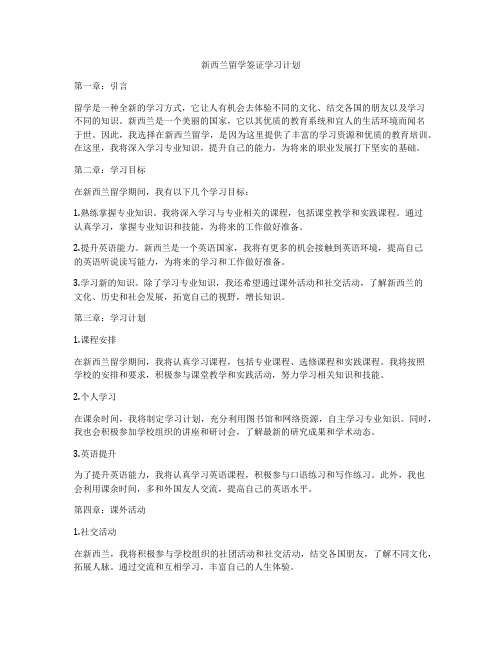
新西兰留学签证学习计划第一章:引言留学是一种全新的学习方式,它让人有机会去体验不同的文化、结交各国的朋友以及学习不同的知识。
新西兰是一个美丽的国家,它以其优质的教育系统和宜人的生活环境而闻名于世。
因此,我选择在新西兰留学,是因为这里提供了丰富的学习资源和优质的教育培训。
在这里,我将深入学习专业知识,提升自己的能力,为将来的职业发展打下坚实的基础。
第二章:学习目标在新西兰留学期间,我有以下几个学习目标:1.熟练掌握专业知识。
我将深入学习与专业相关的课程,包括课堂教学和实践课程。
通过认真学习,掌握专业知识和技能,为将来的工作做好准备。
2.提升英语能力。
新西兰是一个英语国家,我将有更多的机会接触到英语环境,提高自己的英语听说读写能力,为将来的学习和工作做好准备。
3.学习新的知识。
除了学习专业知识,我还希望通过课外活动和社交活动,了解新西兰的文化、历史和社会发展,拓宽自己的视野,增长知识。
第三章:学习计划1.课程安排在新西兰留学期间,我将认真学习课程,包括专业课程、选修课程和实践课程。
我将按照学校的安排和要求,积极参与课堂教学和实践活动,努力学习相关知识和技能。
2.个人学习在课余时间,我将制定学习计划,充分利用图书馆和网络资源,自主学习专业知识。
同时,我也会积极参加学校组织的讲座和研讨会,了解最新的研究成果和学术动态。
3.英语提升为了提升英语能力,我将认真学习英语课程,积极参与口语练习和写作练习。
此外,我也会利用课余时间,多和外国友人交流,提高自己的英语水平。
第四章:课外活动1.社交活动在新西兰,我将积极参与学校组织的社团活动和社交活动,结交各国朋友,了解不同文化,拓展人脉。
通过交流和互相学习,丰富自己的人生体验。
2.实习实践我将主动寻找实习机会,争取在合适的公司或机构进行实习,积累实践经验,提升实际操作能力,为将来的求职打下良好的基础。
3.体育健身除了学习,我也会参与体育健身活动,保持身体健康。
我会利用周末或假期,参加运动比赛或爬山徒步等活动,锻炼身体,放松心情。
新西兰留学学习计划范文

新西兰留学学习计划范文随着人们的生活水平逐渐提高,近年来,越来越多人选择店铺,到外国进行学习生活,的确是可以增长见识,不过再出国之前最好做好学习计划。
下面是由店铺整理的新西兰留学学习计划范文,一起来看看吧。
新西兰留学学习计划范文篇一1.简单说明自己的学习履历,专业配景及事情履历;2.说明自己进一步求学的动机及为什么选择该国,该大学与该专业;3.详细的留学时间摆设;4.介绍留学所需资金及来历;5.对于将来生业目标的论述,留学后回国的理由。
店铺学习计划书书写技巧留学学习规划书的行文风格日文章布局与个人陈述有很大不同,不需要太多个性化和感性的描述,而应该是布局清晰简单,逻辑严紧,论述的事实明确,相关论据有力可信,学成回国的理由要很是充实,而且绝对于不能和声请人的其他材料发生矛盾。
关于学习规划书等留学文件的写作由于使馆的事情人员每天要措置惩罚大量的文件,是以留学学习规划书切不可写的过长,一般不应超过800字,而且说明一个需要别人解答的题目最佳只用一个段落,段落前加上标题,如My Choice of University of Toronto in Canada,My career objective等,以便使馆的事情人员对于您一段内容的中心思惟一目明了。
您的论述应该很是清晰易读,不能希望让使馆的事情人员从您的文字中"挖掘"您"潜在"内容。
留学学习规划书的重点部分是将来的生业规划和留学后回国的理由,路程经过过程这一部分来告诉大使馆您到该国留学后,确实可以或许对于您的生业成长有良好的帮忙,而且有可信有力的理由学成返国。
虽则要求学习规划书的国家往往是移平易近国家,但是由于您声请出国证件的理由是留学,是以路程经过过程学习规划书肯定是要消除您任何移平易近倾向。
1、简单说明自己的学习经历,专业背景及工作经历;2、说明自己进一步求学的动机及为什么选择该国、该大学与该专业;3、详细的留学时间安排;4、介绍留学所需资金及来源;5、对未来职业目标的阐述,留学后回国的理由。
新西兰留学计划书3篇
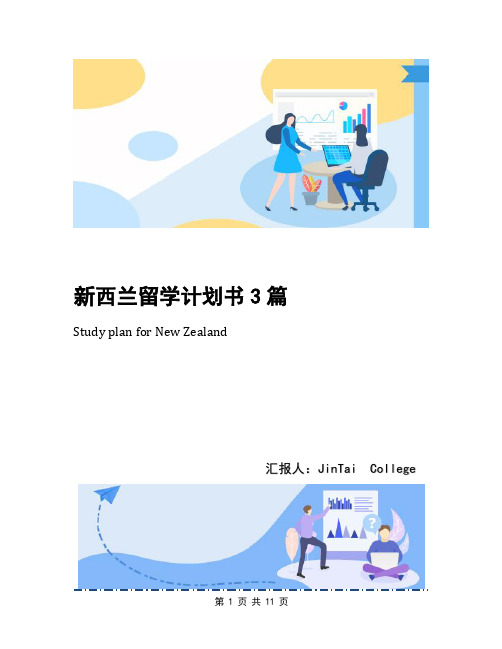
新西兰留学计划书3篇Study plan for New Zealand汇报人:JinTai College新西兰留学计划书3篇前言:工作计划是对一定时期的工作预先作出安排和打算时制定工作计划,有了工作计划,工作就有了明确的目标和具体的步骤,大家协调行动,使工作有条不紊地进行。
工作计划对工作既有指导作用,又有推动作用,是提高工作效率的重要手段。
本文档根据工作计划的书写内容要求,带有规划性、设想性、计划性、方案和安排的特点展开说明,具有实践指导意义。
便于学习和使用,本文档下载后内容可按需编辑修改及打印。
本文简要目录如下:【下载该文档后使用Word打开,按住键盘Ctrl键且鼠标单击目录内容即可跳转到对应篇章】1、篇章1:新西兰留学计划书2、篇章2:新西兰留学计划书3、篇章3:新西兰留学计划书范文篇章1:新西兰留学计划书中国学生申请新西兰学生签证时往往要求向使馆提供学习计划书,通过学习计划书使签证官了解你的背景,使签证官知道你选择新西兰留学的理由,为何申请该大学和该专业,列出清晰的留学时间安排,详述合理的职业规划及充分的回国理由,再配合你的其它材料,签证官来决定是否给你发放学生签证,因此学习计划书是一份很关键的文件。
总的来说,学习计划书需要包括以下几方面内容:1.简单说明自己的学习经历,专业背景及工作经历;2.说明自己进一步求学的动机及为什么选择该国,该大学与该专业;3.详细的留学时间安排;4.介绍留学所需资金及来源;5.对未来职业目标的阐述,留学后回国的理由。
学习计划书的行文风格和文章结构与个人陈述有很大不同,不需要太多个性化和感性的描述,而应该是结构清晰简单,逻辑严密,阐述的事实明确,相关论据有力可信,学成回国的理由要非常充分,并且绝对不能和申请人的其他材料发生矛盾。
由于使馆的工作人员每天要处理大量的文件,因此学习计划书切不可写的太长,并且说明一个问题最好只用一个段落,以便使馆的工作人员对您一段内容的中心思想一目了然。
高考后的新西兰留学规划

高考后的新西兰留学规划新西兰是一个热门的留学国家,去新西兰留学成为很多高考生的留学目标国,那么高考后留学新西兰要怎么规划呢?来看看的相关介绍吧!高考成绩直入新西兰也接受中国的高考成绩,并且新西兰的八大(八所综合性大学)之中目前只有奥克兰大学还不接受高考成绩,其余七所学校均已全面支持高考成绩直申大一了。
这七所学校分别为:奥塔哥大学、坎特伯雷大学、怀卡托大学、惠灵顿维多利亚大学、梅西大学、林肯大学、奥克兰理工大学。
入学要求:高考成绩达到当地一本线(林肯是要求总分的70%)。
雅思要求:总分6.0,单项5.5以上(部分专业要求更高)。
另外有部分理工学院也接受中国高考成绩,包括Unitec国立理工学院、Wintec怀卡托理工学院等,通常要求高考分数达到当地二本线。
国际大一如果高考成绩没有达到,但是又想尽快完成本科学习,可以考虑国际大一。
与澳洲一样,国际大一学习内容与本科大一是一样的,完成之后正常进入大二,与直入的学生一起上课,三年完成本科学习。
目前来说新西兰八大中开设国际大一的学校有坎特伯雷大学和林肯大学。
入学要求:完成三年高中,取得高中毕业证。
雅思要求:总分5.5分。
建议申请时间:最早完成高二时提前进行申请,所以高考后的学生尽快申请了。
预科+本科如果高考成绩没有达到,而上述途径二中的两所学校又不是你的菜;或者你想不参加高考,高二完成之后就尽早去新西兰读书,那么这个途径就最适合你了。
预科是学术课程,而不是语言课程。
预科通常学习五门课程,其主要目的一是为了弥补中国与新西兰之间的教育体制差别(新西兰基础教育13年,中国12年),二是为了大学要学习的专业课程做一些基础知识学习。
预科的总体升学率在90%左右。
新西兰所有的大学,包括奥克兰大学在内都开设有预科课程。
入学要求:完成高二(奥克兰大学也接受完成高一的学生入读)。
雅思要求:总分5.0-5.5分。
建议申请时间:最早可在完成高一后进行申请,高考后的学生要抓紧啦。
新西兰留学英文学习计划
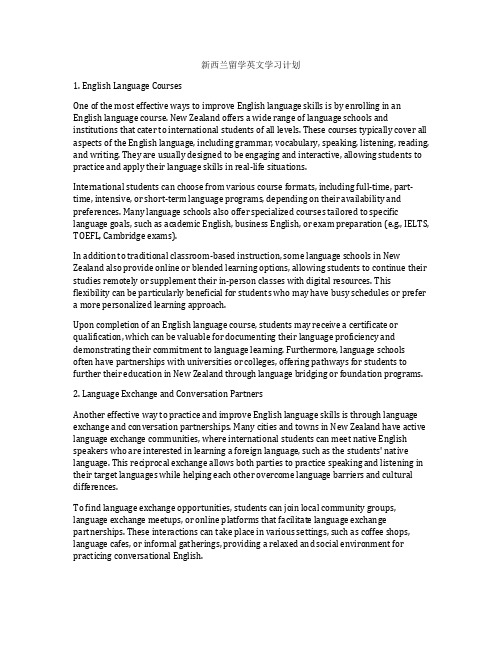
新西兰留学英文学习计划1. English Language CoursesOne of the most effective ways to improve English language skills is by enrolling in an English language course. New Zealand offers a wide range of language schools and institutions that cater to international students of all levels. These courses typically cover all aspects of the English language, including grammar, vocabulary, speaking, listening, reading, and writing. They are usually designed to be engaging and interactive, allowing students to practice and apply their language skills in real-life situations.International students can choose from various course formats, including full-time, part-time, intensive, or short-term language programs, depending on their availability and preferences. Many language schools also offer specialized courses tailored to specific language goals, such as academic English, business English, or exam preparation (e.g., IELTS, TOEFL, Cambridge exams).In addition to traditional classroom-based instruction, some language schools in New Zealand also provide online or blended learning options, allowing students to continue their studies remotely or supplement their in-person classes with digital resources. This flexibility can be particularly beneficial for students who may have busy schedules or prefer a more personalized learning approach.Upon completion of an English language course, students may receive a certificate or qualification, which can be valuable for documenting their language proficiency and demonstrating their commitment to language learning. Furthermore, language schools often have partnerships with universities or colleges, offering pathways for students to further their education in New Zealand through language bridging or foundation programs.2. Language Exchange and Conversation PartnersAnother effective way to practice and improve English language skills is through language exchange and conversation partnerships. Many cities and towns in New Zealand have active language exchange communities, where international students can meet native English speakers who are interested in learning a foreign language, such as the students' native language. This reciprocal exchange allows both parties to practice speaking and listening in their target languages while helping each other overcome language barriers and cultural differences.To find language exchange opportunities, students can join local community groups, language exchange meetups, or online platforms that facilitate language exchange partnerships. These interactions can take place in various settings, such as coffee shops, language cafes, or informal gatherings, providing a relaxed and social environment for practicing conversational English.In addition, some universities and language schools in New Zealand may offer structured conversation partner programs, where international students are paired with local volunteers or peers who are dedicated to supporting their language development. These programs often include regular meetings or activities designed to encourage natural and meaningful interactions in English, fostering friendships and cultural exchange in the process.3. Immersion in English-Speaking EnvironmentsLiving and studying in New Zealand provides international students with the unique opportunity to immerse themselves in an English-speaking environment, surrounded by native speakers and authentic cultural experiences. This immersive approach to language learning can be highly effective, as it allows students to observe, participate, and adapt to real-life communication in English on a daily basis.In and out of the classroom, international students can engage with English in various contexts, such as socializing with local friends, participating in extracurricular activities, volunteering, or exploring the local community. By actively immersing themselves in English-speaking environments, students can develop a deeper understanding of language nuances, idiomatic expressions, and cultural norms, ultimately enhancing their overall language proficiency and communicative competence.Moreover, New Zealand's diverse population and multicultural society offer international students the opportunity to interact with people from different linguistic and cultural backgrounds, further enriching their language learning experience. By embracing diversity and open-mindedness, students can broaden their perspectives, expand their vocabulary, and improve their cross-cultural communication skills, all of which are essential components of language acquisition.4. Self-Study and Autonomous LearningIn addition to formal language courses and social interactions, international students can further strengthen their English language skills through self-study and autonomous learning. This approach empowers students to take ownership of their language development and customize their learning experience according to their unique needs, interests, and learning styles.Self-study resources for English language learners are plentiful, including textbooks, grammar guides, vocabulary builders, online tutorials, language apps, podcasts, audiobooks, and language learning websites. These materials provide comprehensive coverage of language elements and skills, allowing students to practice and reinforce their learning at their own pace and convenience.Moreover, self-directed language learning can be enhanced through various language learning strategies and techniques, such as:- Setting language learning goals: Establishing clear and achievable language goals, whether it be improving speaking fluency, expanding vocabulary, or mastering grammar structures, can provide direction and motivation for language learners.- Creating language learning routines: Establishing consistent study habits and schedules, allocating dedicated time for language practice, and integrating English into daily activities can help maintain a regular and disciplined approach to language learning.- Keeping a language learning journal: Recording language notes, reflections, vocabulary lists, language exercises, or personal experiences in English can facilitate self-assessment, monitor progress, and reinforce language retention.- Using language learning tools and technology: Leveraging digital resources, language learning apps, online dictionaries, and language exchange platforms can supplement formal learning and provide additional opportunities for language practice.Autonomous learning allows students to take advantage of their natural autonomy and self-motivation, fostering independent thinking, problem-solving skills, and self-regulated learning strategies. By actively engaging in self-study, students can build confidence, autonomy, and resilience in their language learning journey, making them more adaptable and flexible in navigating various language learning challenges and opportunities.5. Cultural Immersion and Language IntegrationLearning English in New Zealand goes beyond mastering the language itself; it also involves understanding and embracing the cultural aspects that shape the language and its speakers. As international students immerse themselves in New Zealand's cultural landscape, they have the opportunity to integrate language learning with cultural exploration, social interaction, and intercultural communication.Cultural immersion activities, such as attending cultural events, festivals, workshops, or exhibitions, can provide students with firsthand experiences of New Zealand's customs, traditions, history, and contemporary society. These encounters not only allow students to practice English in authentic contexts but also deepen their cultural awareness and empathy, fostering a more holistic and immersive language learning experience. Furthermore, participating in community service, volunteer work, or internships in New Zealand can offer international students the chance to engage with local communities, contribute to meaningful causes, and develop language and interpersonal skills while making a positive impact in their host country. These experiential opportunities provide a platform for students to build meaningful connections, exchange cultural knowledge, and bridge linguistic and social barriers.Integrating language learning with cultural immersion not only enhances language skills but also promotes cross-cultural competence, intercultural communication, and global citizenship. By being open-minded, respectful, and proactive in engaging with NewZealand's culture and society, international students can foster a deep sense of belonging, respect, and appreciation for the English language and the diverse communities that speak it.6. Language Assessment and Progress MonitoringThroughout their language learning journey in New Zealand, it is important for international students to assess and monitor their language proficiency regularly, to evaluate their progress, identify areas for improvement, and set new language learning objectives. By engaging in ongoing reflection and self-assessment, students can gain insights into their language strengths and weaknesses, track their language development, and adapt their learning strategies accordingly.A common way to assess English language proficiency is through standardized language tests, such as the International English Language Testing System (IELTS), Test of English as a Foreign Language (TOEFL), Cambridge English exams (e.g., FCE, CAE, CPE), or the Pearson Test of English (PTE). These tests evaluate all language skills (listening, reading, writing, speaking) and provide a globally recognized assessment of language ability for academic, professional, or immigration purposes.Many language schools, universities, and immigration authorities in New Zealand require international students to demonstrate a certain level of English proficiency through these standardized tests as part of their educational or visa application processes. Therefore, it is essential for students to prepare for and take these tests when necessary, to meet their specific language proficiency requirements and achieve their academic and career goals in New Zealand.In addition to formal language assessments, students can also track their language learning progress through informal means, such as self-assessment tools, language learning apps, language portfolio development, or regular feedback from instructors, peers, or conversation partners. Documenting language achievements, language milestones, and language learning experiences can serve as a useful record of personal growth, motivation, and commitment to language learning.By engaging in regular language assessment and progress monitoring, students can gain a clear understanding of their language strengths and areas for improvement, adjust their language learning strategies, and stay motivated and focused on their language learning goals. This reflective practice also encourages students to take control of their language learning and work towards continuous improvement in their language skills.7. English Language Support ServicesIn New Zealand, international students have access to a wide range of support services and resources to assist them in their English language learning journey. Many universities, colleges, and language schools offer dedicated language support programs, workshops, tutoring, language labs, and language advising services aimed at helping students improvetheir language skills, overcome language challenges, and integrate into the academic community.These support services may cover various language-related areas, such as academic writing, presentation skills, pronunciation, grammar, study skills, and language test preparation, providing tailored support for specific language needs and academic demands. In addition, international students can seek assistance from qualified language instructors, language advisors, or peer mentors who can provide personalized guidance, feedback, and strategies for effective language learning.Furthermore, international students can take advantage of the numerous language and academic resources available on campus and online, including language learning centers, libraries, online language databases, language learning software, and digital language resources. These resources offer comprehensive language support and self-study materials, enabling students to supplement their formal language instruction and further enhance their language proficiency.It is important for international students to proactively seek out and utilize these English language support services, to maximize their language learning potential and ensure they receive the necessary assistance to thrive in their academic and social endeavors in New Zealand. By taking advantage of these resources, students can receive targeted support and guidance in their language learning journey, making their English language acquisition experience in New Zealand both enriching and successful.ConclusionStudying in New Zealand offers international students a wealth of opportunities to enhance their English language skills through a combination of formal instruction, social interaction, autonomous learning, cultural immersion, and language support services. By engaging in diverse language learning experiences within a supportive environment, students can develop their language proficiency, cultural understanding, and global citizenship, preparing them for success in their academic, professional, and personal lives.As international students embark on their English language learning journey in New Zealand, it is essential for them to be proactive, open-minded, and persistent in their language study. By embracing the rich linguistic and cultural experiences available in New Zealand, they can maximize their language learning potential and cultivate the language skills, cross-cultural competence, and global awareness necessary for succeeding in an increasingly interconnected and diverse world.Ultimately, the English language learning journey in New Zealand is not only about acquiring language skills but also about embracing a new way of thinking, communicating, and connecting with the world. By immersing themselves in New Zealand's English-speaking environment and actively engaging with its language and culture, international students can transform their language learning experience into a meaningful and transformative journey of personal and intellectual growth.。
新西兰留学学习计划书
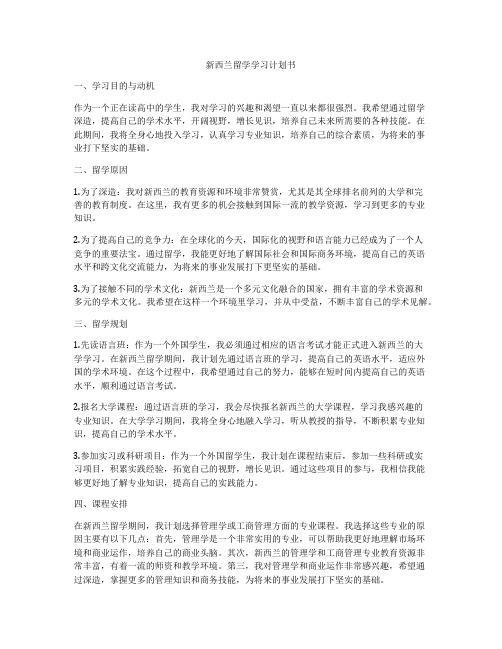
新西兰留学学习计划书一、学习目的与动机作为一个正在读高中的学生,我对学习的兴趣和渴望一直以来都很强烈。
我希望通过留学深造,提高自己的学术水平,开阔视野,增长见识,培养自己未来所需要的各种技能。
在此期间,我将全身心地投入学习,认真学习专业知识,培养自己的综合素质,为将来的事业打下坚实的基础。
二、留学原因1.为了深造:我对新西兰的教育资源和环境非常赞赏,尤其是其全球排名前列的大学和完善的教育制度。
在这里,我有更多的机会接触到国际一流的教学资源,学习到更多的专业知识。
2.为了提高自己的竞争力:在全球化的今天,国际化的视野和语言能力已经成为了一个人竞争的重要法宝。
通过留学,我能更好地了解国际社会和国际商务环境,提高自己的英语水平和跨文化交流能力,为将来的事业发展打下更坚实的基础。
3.为了接触不同的学术文化:新西兰是一个多元文化融合的国家,拥有丰富的学术资源和多元的学术文化。
我希望在这样一个环境里学习,并从中受益,不断丰富自己的学术见解。
三、留学规划1.先读语言班:作为一个外国学生,我必须通过相应的语言考试才能正式进入新西兰的大学学习。
在新西兰留学期间,我计划先通过语言班的学习,提高自己的英语水平,适应外国的学术环境。
在这个过程中,我希望通过自己的努力,能够在短时间内提高自己的英语水平,顺利通过语言考试。
2.报名大学课程:通过语言班的学习,我会尽快报名新西兰的大学课程,学习我感兴趣的专业知识。
在大学学习期间,我将全身心地融入学习,听从教授的指导,不断积累专业知识,提高自己的学术水平。
3.参加实习或科研项目:作为一个外国留学生,我计划在课程结束后,参加一些科研或实习项目,积累实践经验,拓宽自己的视野,增长见识。
通过这些项目的参与,我相信我能够更好地了解专业知识,提高自己的实践能力。
四、课程安排在新西兰留学期间,我计划选择管理学或工商管理方面的专业课程。
我选择这些专业的原因主要有以下几点:首先,管理学是一个非常实用的专业,可以帮助我更好地理解市场环境和商业运作,培养自己的商业头脑。
新西兰学习计划

新西兰学习计划篇一:新西兰留学教你如何写学习计划书新西兰留学教你如何写学习计划书浏览:2818 | 更新:XX-05-08 18:01 | 标签:留学中国学生去新西兰留学时申请新西兰学生签证时往往要求向使馆提供学习计划书,通过学习计划书使签证官了解你的背景,使签证官知道你选择新西兰留学的理由,为何申请该大学和该专业,列出清晰的留学时间安排,详述合理的职业规划及充分的回国理由,再配合你的其它材料,签证官来决定是否给你发放学生签证,因此学习计划书是一份很关键的文件。
所以许多想留学的学生往往搞不清楚学习计划书和个人陈述(Personal Statement)区别和写法。
一般来说学习计划书可以按照提交目的分成两类,既给大使馆申请签证用的,或是给学校申请录取用的。
用来申请学校的学习计划从本质上讲和个人陈述是同一类型的文书,关于学校申请类的学习计划书可以参考个人陈述方面的文章,本文主要介绍提交大使馆签证用的学习计划书。
总的来说,学习计划书需要包括以下几方面内容: 步骤/方法1. 11.简单说明自己的学习经历,专业背景及工作经历;2. 22.说明自己进一步求学的动机及为什么选择该国,该大学与该专业;3. 33.详细的留学时间安排;4. 44.介绍留学所需资金及来源;5. 55.对未来职业目标的阐述,留学后回国的理由。
END注意事项(1)学习计划书的行文风格和文章结构与个人陈述有很大不同,不需要太多个性化和感性的描述,而应该是结构清晰简单,逻辑严密,阐述的事实明确,相关论据有力可信,学成回国的理由要非常充分,并且绝对不能和申请人的其他材料发生矛盾。
(2)由于使馆的工作人员每天要处理大量的文件,因此学习计划书切不可写的太长,并且说明一个问题最好只用一个段落,以便使馆的工作人员对您一段内容的中心思想一目了然。
您的阐述应该非常清晰易读,不能希望让使馆的工作人员从您的文字中"挖掘"您"潜在"内容。
高三学生留学新西兰四大方案详解
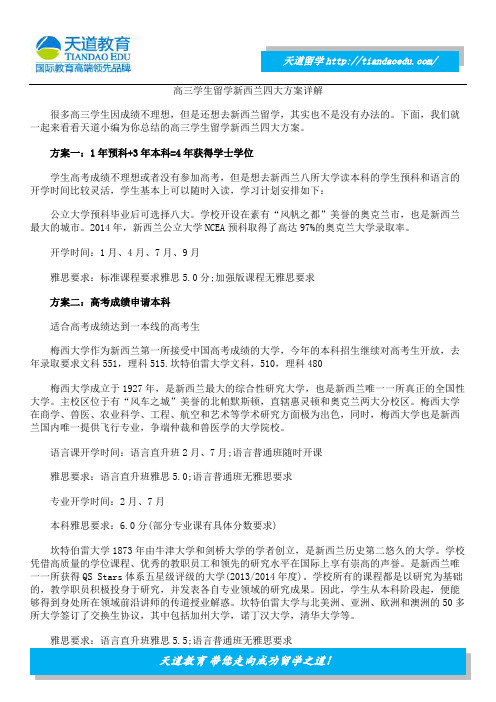
高三学生留学新西兰四大方案详解很多高三学生因成绩不理想,但是还想去新西兰留学,其实也不是没有办法的。
下面,我们就一起来看看天道小编为你总结的高三学生留学新西兰四大方案。
方案一:1年预科+3年本科=4年获得学士学位学生高考成绩不理想或者没有参加高考,但是想去新西兰八所大学读本科的学生预科和语言的开学时间比较灵活,学生基本上可以随时入读,学习计划安排如下:公立大学预科毕业后可选择八大。
学校开设在素有“风帆之都”美誉的奥克兰市,也是新西兰最大的城市。
2014年,新西兰公立大学NCEA预科取得了高达97%的奥克兰大学录取率。
开学时间:1月、4月、7月、9月雅思要求:标准课程要求雅思5.0分;加强版课程无雅思要求方案二:高考成绩申请本科适合高考成绩达到一本线的高考生梅西大学作为新西兰第一所接受中国高考成绩的大学,今年的本科招生继续对高考生开放,去年录取要求文科551,理科515.坎特伯雷大学文科,510,理科480梅西大学成立于1927年,是新西兰最大的综合性研究大学,也是新西兰唯一一所真正的全国性大学。
主校区位于有“风车之城”美誉的北帕默斯顿,直辖惠灵顿和奥克兰两大分校区。
梅西大学在商学、兽医、农业科学、工程、航空和艺术等学术研究方面极为出色,同时,梅西大学也是新西兰国内唯一提供飞行专业,争端仲裁和兽医学的大学院校。
语言课开学时间:语言直升班2月、7月;语言普通班随时开课雅思要求:语言直升班雅思5.0;语言普通班无雅思要求专业开学时间:2月、7月本科雅思要求:6.0分(部分专业课有具体分数要求)坎特伯雷大学1873年由牛津大学和剑桥大学的学者创立,是新西兰历史第二悠久的大学。
学校凭借高质量的学位课程、优秀的教职员工和领先的研究水平在国际上享有崇高的声誉。
是新西兰唯一一所获得QS Stars体系五星级评级的大学(2013/2014年度)。
学校所有的课程都是以研究为基础的,教学职员积极投身于研究,并发表各自专业领域的研究成果。
- 1、下载文档前请自行甄别文档内容的完整性,平台不提供额外的编辑、内容补充、找答案等附加服务。
- 2、"仅部分预览"的文档,不可在线预览部分如存在完整性等问题,可反馈申请退款(可完整预览的文档不适用该条件!)。
- 3、如文档侵犯您的权益,请联系客服反馈,我们会尽快为您处理(人工客服工作时间:9:00-18:30)。
新西兰留学学习计划
新西兰英文缩写NZ,又译纽西兰,位于太平洋西南部,是个岛屿国家。
新西兰留学学习计划怎么写呢?下面为你整理了几篇新西兰留学学习计划范文,希望对你有帮助。
新西兰留学学习计划范文一
大学生国外留学学习计划书【一】
我叫***,出生于****年**月**日,是2015年高中应届毕业生并参加2015年全国统一高考,并被金华一专科学校汽车销售与维修专业录取。
被录取后虽然成为了一名大学生,但是没能被自己所向往的计算机专业所录取。
而且现在进入了信息化时代,使我觉得将来计算机专业的就业前景将比汽车销售与维修专业的就业前景好更容易得到一份好的工作。
法国是一个我很喜欢的国家不仅有美丽的城市,而且是一个高度信息化的国家。
所以我选择留学法国。
我知道的中国的传统教育体制还是学习方法及思维方式与国外有着很大的不同点。
国外那种重视素质教育,培养学生思维创新的教育体制正是我所向往的那种教育体制,但我知道将会有很多的困难出现在我的面前。
因此我会努力去掌握语言,去适应新的学习环境,以及适应法国的文化。
在做出留学法国的决定前,我与家人进行了多次意见交换得到了
父母的支持,这更加坚定了我的去法国留学的信念。
并且给自己制定了留学计划:出国留学网
首先,要在最短的时间内掌握法语并适应法国的文化,努力在去法国的第一年学好法语并通过语言测试。
其次,学习我所喜爱的计算机专业知识并尽快地适应法国的学习环境与法律法规,并在预算的3-4年的时间内顺利完成学业,学成回国。
完成学业回到中国后,我将在中国的计算机领域中找一个适合自己的工作并把自己在法国所学的计算专业知识运用在该工作中,我相信法国将是我人生的另一起点,我会在这个美丽的国家完成学业,为以后的成功奠定基础。
新西兰留学学习计划范文二
我于1989年9月出生于广东省茂名市,是一名华南师范大学教育信息技术学院在读二年级本科生,现在就读教育技术学专业。
对于韩国,我的如下懵懂的了解,韩国与中国都属于东亚国家,同样是传统的东方礼仪之邦,具有悠久的历史和灿烂的文化。
无论是在语言、文字上,还是在传统的建筑、服饰、饮食文化上,都蕴含着独特的民族色彩,更令人向往的是,现代的韩国在各方面,如科技、教育、艺术等都飞速发展着,并一跃成为亚洲四小龙之一。
我希望能到韩国学习,并选择了汉阳大学师范学院中的计算机教育学科专业,此专业与教育技术学相近,经过了大学两年的学习,我渐渐熟悉并能够较好地驾驭这个专业,望学校能给我一个机会让我到韩国
继续深造。
假如我有幸到韩国学习,我将按照下面的计划学习、生活。
(一)明确学习目标。
近期内先学习韩语,打好一定的语言基础,并多查找资料更深入地去了解韩国的方方面面,做好充分的准备。
(二)九、十月,这是到达韩国的第一、第二个月。
了解当地的风俗习惯、领略当地的风土人情、认识学校的概况、结交新同学、适应新环境是此阶段的重要工作,通过网络资源、图书馆资源、身边的外国朋友、亲身实践是来完成此项任务,时刻铭记自己作为交换生的责任和义务,为华师为祖国增光添彩。
(三)十、十一,这是到韩国学习的中间阶段,也是转折点。
第二项计划完成的情况会影响接下来的几个月的生活和学习,因此,前一项计划一定要尽可能完美地完成。
不可否认,韩国各项经济水平都比中国高,相应地生活水平也高,到韩国学习,这种开资不是一般的家庭能够承担的。
为此,在这三个月里,我会勤工俭学,在学校里当中文老师或者到外面做兼职,如麦当劳、肯德基等,前提条件是不影响学习,半工半读,通过自己的双手获取一定数目的收入,既能够与韩国人打交道的同时也可以锻炼自己的动手能力,培养自己的经济意识,何乐而不为呢?十一月份将有其中考试,我想这正是检验自己学习情况的大好时机,我将以极大的热情和激情投入到学习中,以饱满的信心迎接韩国交换生的第一场正式考试。
(四)十二月,这是韩国大学期末考试时间。
我会比在华师期间付出更大的努力来备考,不仅是因为韩语教学,更是为了证明自己的学
习能力,证明中国人的学习热情,同时,在备考的过程中要注意把知识学以致用,温故而知新,争取拿到优异的成绩。
(五)2014年一、二月,这是学校的寒假时间。
对于这个来之不易的学习机会,我会放弃回国休假的机会,将会选择留校学习。
这期间主要是反思自己这一个学期来的学习和生活情况,订下下半学年的计划,反思自己有哪些方面做到不足,反思自己该如何改善、反思自己继续努力的方向方法,并且反思自己有哪些反面值得肯定,只有不断地反省,才能为未来的路指明方向。
(六)三、四月,新学期的开始。
对比上年的自己,我应该更加成熟更加稳重,应该能够克服一切的困难来完全融入到韩国的生活中,并且反复修改自己的学习计划,提高计划观念和计划能力,使自己成为能够有条理地安排学习,生活,工作的人。
(七)五、六、七月,全面发展自己。
使自己成为德、智、体、美、劳全面发展的优秀学生,按照学校的要求和自己实际情况安排后期的学习。
(八)八月,回国阶段。
总结这一年的交换生活,并且构思好回国计划,把自己在韩国所学所感所思综合应用,为自己的未来为祖国的发展贡献自己微薄的力量。
当然,计划是时刻变化的,上面的几点只是一个轮廓,具体情况还需具体分析,我希望可以通过自己的努力赢得韩国学生的认同,提高自己的专业知识和能力,争取早日报效祖国。
新西兰留学学习计划范文三
1.简单说明自己的学习履历,专业配景及事情履历;
2.说明自己进一步求学的动机及为什么选择该国,该大学与该专业;
3.详细的留学时间摆设;
4.介绍留学所需资金及来历;
5.对于将来生业目标的论述,留学后回国的理由。
出国留学学习计划书书写技巧
留学学习规划书的行文风格日文章布局与个人陈述有很大不同,不需要太多个性化和感性的描述,而应该是布局清晰简单,逻辑严紧,论述的事实明确,相关论据有力可信,学成回国的理由要很是充实,而且绝对于不能和声请人的其他材料发生矛盾。
关于学习规划书等留学文件的写作由于使馆的事情人员每天要措置惩罚大量的文件,是以留学学习规划书切不可写的过长,一般不应超过800字,而且说明一个需要别人解答的题目最佳只用一个段落,段落前加上标题,如My Choice of University of Toronto in Canada,My career objective等,以便使馆的事情人员对于您一段内容的中心思惟一目明了。
您的论述应该很是清晰易读,不能希望让使馆的事情人员从您的文字中"挖掘"您"潜在"内容。
留学学习规划书的重点部分是将来的生业规划和留学后回国的理由,路程经过过程这一部分来告诉大使馆您到该国留学后,确实可以或许对于您的生
业成长有良好的帮忙,而且有可信有力的理由学成返国。
虽则要求学习规划书的国家往往是移平易近国家,但是由于您声请出国证件的理由是留学,是以路程经过过程学习规划书肯定是要消除您任何移平易近倾向。
1、简单说明自己的学习经历,专业背景及工作经历;
2、说明自己进一步求学的动机及为什么选择该国、该大学与该专业;
3、详细的留学时间安排;
4、介绍留学所需资金及来源;
5、对未来职业目标的阐述,留学后回国的理由。
